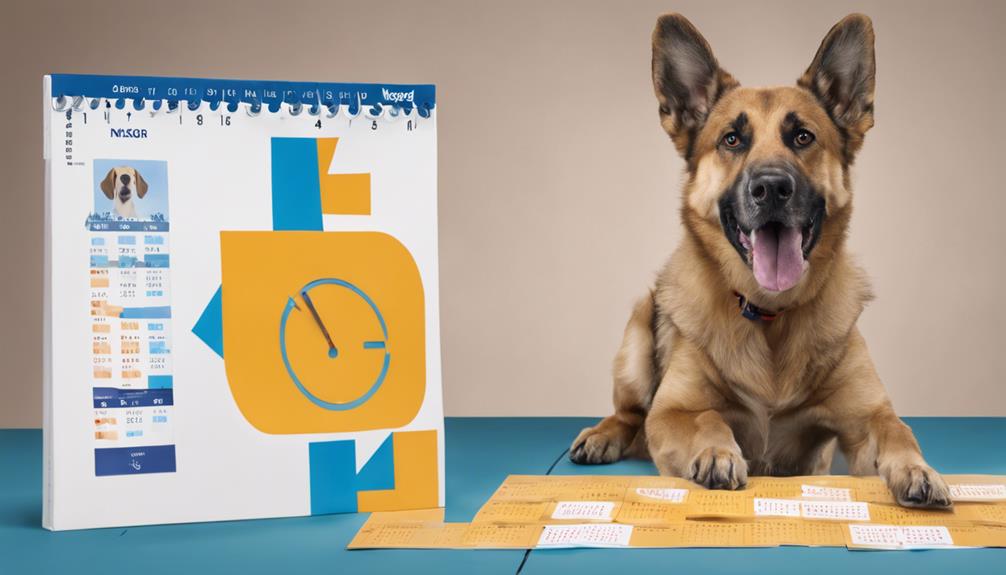Can I Give Nexgard Early
You can give Nexgard early with veterinarian guidance. Follow dosage instructions, watch for reactions, and inform about medications. Administering early shields pet from fleas and ticks, building protection. There are risks like overmedication or reduced efficacy. Benefits include earlier pest prevention and health protection. Consult your vet before starting to ensure suitability, personalized advice, and safety. Additional considerations and details are available for a comprehensive understanding.
Key Takeaways
- Consult veterinarian for tailored advice on early Nexgard use.
- Administering early ensures continuous protection against fleas and ticks.
- Early Nexgard use breaks flea life cycle and prevents serious diseases.
- Risks include overmedication and reduced effectiveness, consult before deviating.
- Veterinarian guidance crucial for safety and optimal protection.
Safety Considerations for Early Nexgard Use
When giving Nexgard early, ensure the safety of your pet by consulting with a veterinarian. Your veterinarian can provide guidance tailored to your pet’s specific needs, taking into account factors such as age, weight, health status, and any existing medical conditions. It’s crucial to follow the recommended dosage and administration instructions to prevent any potential adverse effects and maximize the effectiveness of the treatment.
Before starting Nexgard, inform your veterinarian about any medications your pet is currently taking, including supplements, to avoid any potential drug interactions. Additionally, discuss any known allergies your pet may have to prevent allergic reactions to the medication.
Monitoring your pet for any signs of adverse reactions after administering Nexgard is essential. If you notice any unusual symptoms such as vomiting, diarrhea, lethargy, or loss of appetite, contact your veterinarian immediately for further guidance.
Efficacy of Administering Nexgard in Advance
To ensure optimal effectiveness, consider administering Nexgard in advance as recommended by your veterinarian. Giving Nexgard early can help protect your pet from fleas and ticks before they become a problem. By administering the medication ahead of time, you’re being proactive in safeguarding your furry friend against potential infestations.
Nexgard works by killing fleas and ticks upon contact with your pet’s bloodstream, preventing them from biting and transmitting harmful diseases. When given in advance, Nexgard has the chance to build up in your pet’s system, providing continuous protection against parasites. This proactive approach ensures that your pet is shielded from pests right from the start.
Administering Nexgard early is especially beneficial if you live in an area where fleas and ticks are prevalent year-round. By staying ahead of the game and giving Nexgard in advance, you can help maintain a flea- and tick-free environment for your beloved companion. Talk to your veterinarian about the best timing for administering Nexgard to keep your pet protected.
Potential Risks of Giving Nexgard Early
Considering the benefits of administering Nexgard in advance, it’s important to also be aware of the potential risks associated with giving the medication early to your pet. One significant risk is the possibility of overmedication. Providing Nexgard before the scheduled time may lead to an accumulation of the active ingredients in your pet’s system, potentially causing adverse effects.
Moreover, administering Nexgard too early can disrupt the intended dosing schedule, which may reduce the medication’s overall effectiveness in protecting your pet against fleas and ticks. Another risk to be mindful of is the potential for allergic reactions. While Nexgard is generally well-tolerated, giving it prematurely increases the chances of your pet having an unexpected allergic response to the medication.
Additionally, early administration may result in a higher likelihood of medication errors, as it can be easy to forget when the next dose is due after giving it ahead of schedule. Always consult your veterinarian before deviating from the recommended dosing regimen to avoid these potential risks.
Benefits of Early Nexgard Administration
Getting a head start on administering Nexgard can provide your pet with earlier protection against fleas and ticks. By giving Nexgard early, you can help prevent your pet from suffering from the discomfort and health risks associated with flea and tick infestations.
Nexgard works quickly to kill fleas before they’ve a chance to lay eggs, helping to break the flea life cycle and reduce the chances of an infestation in your home. Ticks can transmit serious diseases to both pets and humans, so early protection against them is crucial.
Moreover, starting Nexgard early can also help in preventing skin irritations and allergic reactions that can result from flea bites. By keeping your pet protected from fleas and ticks from the beginning, you can ensure their overall health and well-being.
It’s a proactive approach to pet care that can save you from the stress and costs associated with treating flea and tick problems later on.
Consultation With a Veterinarian Before Early Use
Before starting Nexgard early for your pet, consulting with a veterinarian is essential to ensure its suitability and safety for your furry companion. Your veterinarian plays a crucial role in evaluating your pet’s specific health needs and determining if early administration of Nexgard is appropriate. They can provide personalized advice based on factors such as your pet’s age, weight, breed, medical history, and any existing health conditions.
During the consultation, your veterinarian can address any concerns you may have regarding Nexgard, such as potential side effects or interactions with other medications your pet may be taking. They can also guide you on the correct dosage and administration of the medication to maximize its effectiveness and minimize any risks.
Frequently Asked Questions
Can Nexgard Be Given Early to Puppies Under 8 Weeks of Age?
You should not give Nexgard to puppies under 8 weeks of age. It’s important to follow the recommended guidelines for the safety and well-being of your pet. Consult your veterinarian for advice on flea and tick prevention.
Are There Any Known Interactions Between Nexgard and Other Medications if Given Early?
When giving Nexgard early, it’s important to consider potential interactions with other medications. Always consult your veterinarian before combining Nexgard with any other drugs to ensure your pet’s safety and well-being.
What Factors Should Be Considered When Deciding to Give Nexgard Early to a Dog?
When deciding to give Nexgard early to your dog, consider their age, weight, health conditions, and previous reactions to the medication. Consult your vet for guidance on appropriate dosing and potential risks to ensure your furry friend’s safety.
Are There Any Long-Term Effects of Giving Nexgard Early That Pet Owners Should Be Aware Of?
Be aware that giving Nexgard early may have long-term effects on your pet. Consult your vet to understand potential risks and benefits. Monitoring for any changes in behavior or health is crucial.
Is There a Recommended Timeline for Administering Nexgard Early for Optimal Effectiveness?
For optimal effectiveness, administer Nexgard as recommended by your vet. Giving it early without professional advice could impact its efficacy. Stay informed about the ideal timeline for your pet’s well-being and safety.
Conclusion
In conclusion, it’s important to consult with your veterinarian before giving Nexgard early to ensure the safety and efficacy for your pet.
While there may be potential risks involved with administering the medication ahead of schedule, the benefits of early Nexgard use may outweigh these concerns in certain cases.
Always prioritize the well-being of your furry friend and seek professional advice when considering any changes to their treatment plan.








